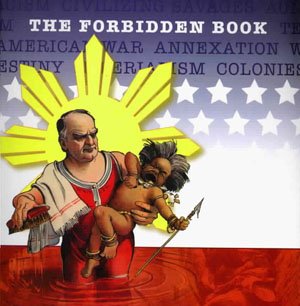
Iraq, Afghan Wars Parallel Philippine Invasion
*********************************************************
Courtesy Of: AScribe.org
Wednesday, April 15, 2006
Baltimore, April 12 (AScribe Newswire)--It was Mark Twain who said, "history doesn't repeat itself, but it does rhyme." Few today remember that the celebrated author was also a vocal critic of a U.S war of empire a century ago: The Invasion Of The Philippines.
Historian Paul Kramer, in his new book "The Blood Of Government: Race, Empire, The United States and The Philippines" (University of North Carolina Press), details the long-forgotten history of the Philippine-American War.
He argues that the Philippine adventure in many ways "rhymes" with the current U.S. occupations of Iraq and Afghanistan.
Among the "eerier similarities," said Kramer, Professor of History at The Johns Hopkins University:
-A conventional invasion and speedy victory followed by an unexpected, protracted non-conventional insurgency.
-Violations of human rights norms by the occupying Americans.
-Repeated claims that the war was Justified by and fought on behalf of higher principles of "civilization" or "freedom."
-Declarations that the war was over in hopes of ending domestic controversy about it.
-The sense that it was America's right, duty and obligation to engage in nation building and installing "democracy," of which the United States was considered an unblemished example.
"I'm not surprised at these parallels," Kramer said. "Indeed, what's remarkable is our persistence in suppressing the memory of this earlier war, a persistence that I think is all that makes debacles like the present one 'surprising.'"
The U.S experience in Vietnam is another example of the nation's inability to focus on the lessons of the Philippine-American War, he said.
"In all three conflicts," Kramer said "U.S." officials predicted easy victories, underestimated guerrilla forces and, arrogantly assuming their objectives were universally shared, were shocked when U.S. troops were not greeted as "liberators,"
Kramer describes in "The Blood Of Government," to be published April 17, how the Philippine-American War began in the unsettled aftermath of the Spanish-American War, the 1898 conflict that Secretary of State, John Hay dubbed "A Splendid War."
Having declared war against Spain, the United States sent Commodore George Dewey to the Philippines, Spain's largest Asian Colony.
Dewey's Pacific Squadron quickly defeated Spanish naval forces at Manila Bay, but the question remained, Kramer said, how U.S. forces should engage with a Philippine revolutionary movement that broke from Spain in June 1898 and declared the first republic in Asia.
U.S. forces attempted to make use of Filipino revolutionaries--who were defeating Spanish land forces in the islands--Witout recognizing their government. Filipinos, they assumed, would greet U.S. forces as "liberators."
When Spain surrendered, Filipino diplomats were not invited to treaty negotiations. U.S. negotiators pressed Spain to relinquish "sovereignty" over the Philippines--an archipeligo Spain no longer controlled--For $20 million.
In February, U.S. forces outside of Manila fired on soldiers of the declared Philippine Republic and the Philippine-American War began. It would in no sense be either "Splendid" or "Little," Kramer said. It lasted more than three years, in some places as long as 10.
It involved 126,000 U.S. troops and resulted in nearly 5,000 U.S. casualties, an estimated 12,00 Filipino military casualties, and the death by violence, dislocation and disease of an estimated 250,000 Filipino civilians.
It began as a conventional struggle, but facing early defeats, Filipino leader Emilio Aguinaldo opted for guerrilla tactics in November 1899.
U.S. generals, watching enemy forces apparently dissolve, made declarations equivalent to "Mission Accomplished" and "End To Major Combat Operations."
But as U.S. forces occupied rural towns, they found themselves persistently attacked by guerrilla fighters supported by local peasants.
Increasingly, U.S. soldiers would see the entire population as the enemy, expressing their hatred using racial terminology like "goo-goo" (which later evolved into the Vietnam-era "gook").
They would also use increasingly harsh tactics, including the burning of whole villages and the torture of prisoners using what was called "Water Cure" (the antecedent to today's "Water Boarding").
Despite military censorship, word of U.S. atrocities traveled back home and was spread by anti-war activists organized into an Anti-Imperialist League, Kramer said.
The Anti-Imperialists (among them Twain, industrialist Andrew Carnegie and labor leader Samuel Gompers) declared the U.S. invasion immoral in both its objectives and its tactics.
They made the war a central issue of the 1900 presidential race between William Jennings Bryan and incumbent William McKinley, who defended it as a war for "civilization" and "freedom."
Anti-War activism resulted in a Senate investigation and some courts-martial, although few were punished for war crimes.
In defending itself against critics, the administration claimed that Filipinos were not fighting a "civilized" war and were, therefore, not owed the rights of prisoners of war, instead, they were "war rebels" who U.S. forces could treat however they pleased.
Kramer's 538-page book deals both with the invasion and the occupations, telling of the first-ever attempt by U.S. forces to engage in overseas "nation-building" in collaboration with a local elite, even in the midst of ongoing violence.
"I did most of the research long before 9/11 on the U.S. invasion of Iraq," Kramer said, "And in many ways I was overtaken by the eruption of a new aggressive imperial moment Just as I was completing my manuscript on an early similar one Just over a century ago."
"The challenge," he said, "has been to remain true to the idiosyncrasy and integrity of the past while trying to comment subtly and critically on the present to allow the past and the present to touch without subordinating my account of the earlier U.S. invasion to the questions being asked of the present conflict."
Source:
http://ascribe.org/cgi-bin/behold.pl?ascribeid=20060412.145118&time=15
No comments:
Post a Comment